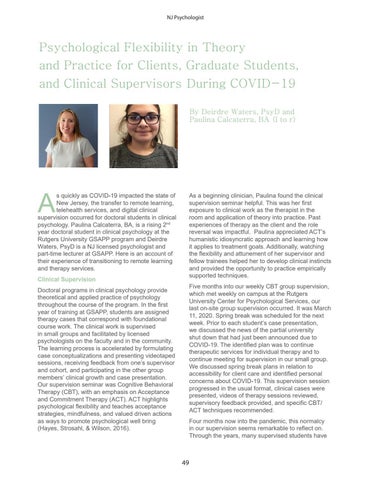NJ Psychologist
Psychological Flexibility in Theory and Practice for Clients, Graduate Students, and Clinical Supervisors During COVID-19 By Deirdre Waters, PsyD and Paulina Calcaterra, BA (l to r)
A
s quickly as COVID-19 impacted the state of New Jersey, the transfer to remote learning, telehealth services, and digital clinical supervision occurred for doctoral students in clinical psychology. Paulina Calcaterra, BA, is a rising 2nd year doctoral student in clinical psychology at the Rutgers University GSAPP program and Deirdre Waters, PsyD is a NJ licensed psychologist and part-time lecturer at GSAPP. Here is an account of their experience of transitioning to remote learning and therapy services.
As a beginning clinician, Paulina found the clinical supervision seminar helpful. This was her first exposure to clinical work as the therapist in the room and application of theory into practice. Past experiences of therapy as the client and the role reversal was impactful. Paulina appreciated ACT’s humanistic idiosyncratic approach and learning how it applies to treatment goals. Additionally, watching the flexibility and attunement of her supervisor and fellow trainees helped her to develop clinical instincts and provided the opportunity to practice empirically supported techniques.
Clinical Supervision
Five months into our weekly CBT group supervision, which met weekly on campus at the Rutgers University Center for Psychological Services, our last on-site group supervision occurred. It was March 11, 2020. Spring break was scheduled for the next week. Prior to each student’s case presentation, we discussed the news of the partial university shut down that had just been announced due to COVID-19. The identified plan was to continue therapeutic services for individual therapy and to continue meeting for supervision in our small group. We discussed spring break plans in relation to accessibility for client care and identified personal concerns about COVID-19. This supervision session progressed in the usual format, clinical cases were presented, videos of therapy sessions reviewed, supervisory feedback provided, and specific CBT/ ACT techniques recommended.
Doctoral programs in clinical psychology provide theoretical and applied practice of psychology throughout the course of the program. In the first year of training at GSAPP, students are assigned therapy cases that correspond with foundational course work. The clinical work is supervised in small groups and facilitated by licensed psychologists on the faculty and in the community. The learning process is accelerated by formulating case conceptualizations and presenting videotaped sessions, receiving feedback from one’s supervisor and cohort, and participating in the other group members’ clinical growth and case presentation. Our supervision seminar was Cognitive Behavioral Therapy (CBT), with an emphasis on Acceptance and Commitment Therapy (ACT). ACT highlights psychological flexibility and teaches acceptance strategies, mindfulness, and valued driven actions as ways to promote psychological well bring (Hayes, Strosahl, & Wilson, 2016).
Four months now into the pandemic, this normalcy in our supervision seems remarkable to reflect on. Through the years, many supervised students have
49












